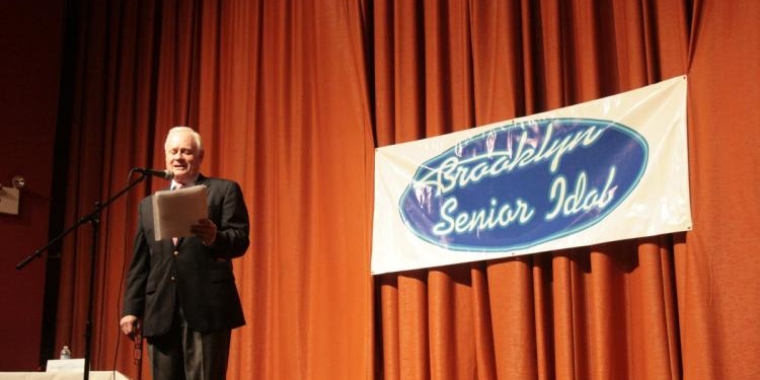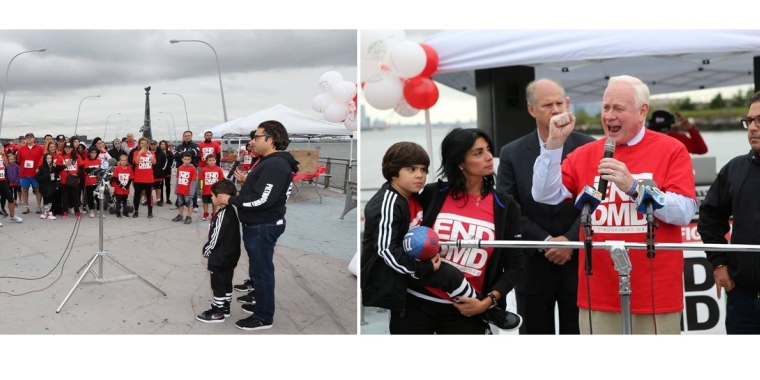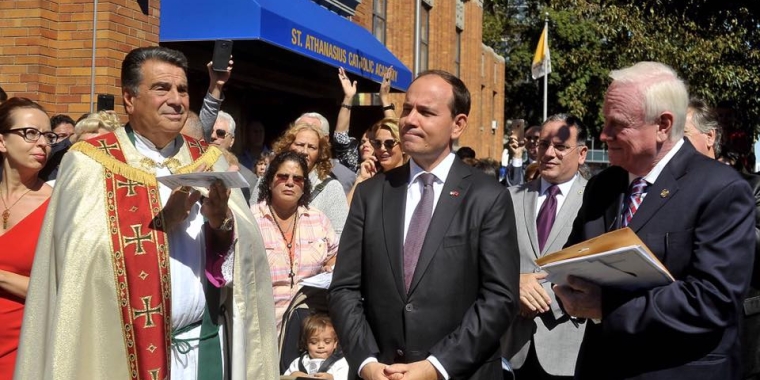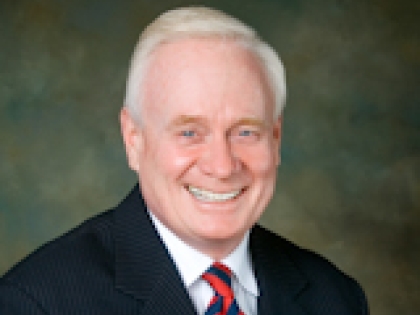
Mayor Bloomberg, State Senator Golden and Suny Downstate Announce Development of New Commercial Bioscience Center at Brooklyn Army Terminal in Sunset Park
Martin J. Golden
May 20, 2010
-
ISSUE:
- Economic Development
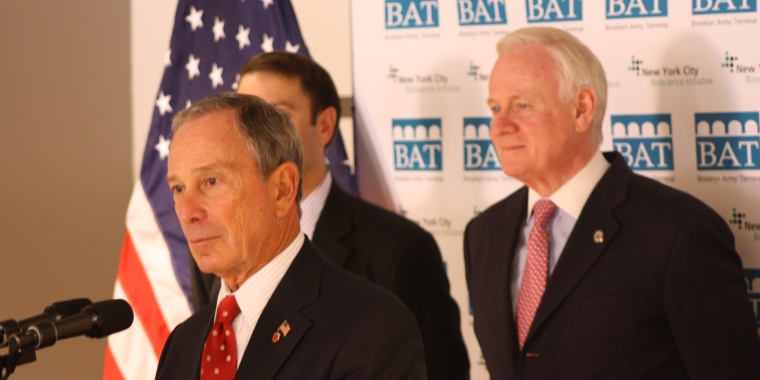
BioBAT - a Partnership between the City and SUNY Downstate Medical Center – Will Create Nearly 500,000 Square Feet of Commercial Lab Space and More than 1,000 Permanent Jobs
Mayor Michael R. Bloomberg, State Senator Martin Golden and State University of New York (SUNY) Downstate President Dr. John C. LaRosa today announced the start of development of BioBAT, a 486,000-square-foot center for commercial bioscience at the Brooklyn Army Terminal. The design of BioBAT - a partnership between New York City and SUNY Downstate Medical Center - is now underway, and construction on the first 56,000 square feet of space will begin this year with completion expected in 2011. The project will create more than 1,000 permanent jobs. Mayor Bloomberg was joined at the announcement, held at the Brooklyn Army Terminal, by Brooklyn Borough President Marty Markowitz, Council Member Sara M. Gonzalez, New York City Economic Development Corporation (NYCEDC) President Seth W. Pinsky, BioBAT President Dr. Eva Cramer and International AIDS Vaccine Initiative Senior Vice President Lisa Beyer.
"New York City is home to nine top academic medical and research institutions - more than any city nationwide - and they produce between 20 and 30 early-stage bioscience companies annually," said Mayor Bloomberg. "Unfortunately, as many of those companies start up and grow, they move out of the City because New York doesn't have appropriate commercial lab space available to them. With the development of BioBAT - together with the East River Science Park, set to open this fall - we are building ten times the amount of commercial lab space that's currently available. With all of New York City's competitive advantages in the bioscience industry, those efforts will help attract new companies, create thousands of permanent jobs and provide an economic engine for our city for years to come."
The Brooklyn Army Terminal is a 97-acre Cass Gilbert-designed facility on the Brooklyn waterfront, owned by New York City and managed by NYCEDC. BioBAT, Inc., a nonprofit corporation made up of the Research Foundation of the State University of New York on behalf of SUNY Downstate Medical Center and NYCEDC, was established to foster the development of commercial bioscience research, development, and manufacturing space in Brooklyn. The City invested $12 million and State Senator Golden, working with SUNY Downstate and the City, secured an additional $48 million in State funding to facilitate the project. The Brooklyn Army Terminal is already home to the International AIDS Vaccine Initiative, which developed and occupied 36,000 square feet of space for its AIDS Vaccine Design and Development Laboratory in November 2008.
"This is a long-term investment in Brooklyn," said State Senator Golden. "This cutting-edge, high-tech, research and bio-manufacturing facility, one of the largest on the East coast, will put us in the position to create jobs now and compete for the jobs of tomorrow. The time, the energy, and the thought that has gone into creating this biotech park, has the potential to make Brooklyn the 'Silicon Valley' of the biotech industry."
"This new development of the Brooklyn Army Terminal's BioBAT facility will help strengthen New York's competitive edge in the field of biotechnology, generate much-needed jobs, and encourage the growth of local manufacturing and small businesses," said Congressman Jerrold Nadler. "Especially now, during the ongoing recession, investing in dynamic new industries and creating local jobs is critical and will have a lasting effect on our regional economy."
"With all our digital start-ups, Brooklyn is certainly going high-tech, and projects like BioBAT show Brooklyn is also going biotech," said Borough President Markowitz. "Bravo to Mayor Bloomberg, Seth Pinsky and the EDC, Senator Marty Golden and SUNY Downstate Medical Center for investing in Brooklyn and securing this new commercial laboratory space at the Brooklyn Army Terminal. BioBAT and the SUNY Downstate Advanced Biotechnology Incubator, which my office has been thrilled to support, are providing much-needed jobs today and ensuring that New York City remains on the cutting edge of the burgeoning biotech industry in the days to come."
"BioBAT represents what is best about our working waterfront in Brooklyn," said Council Member Gonzalez. "Not only does it represent much appreciated economic investment in the area, but BioBAT also demonstrates State and City commitment to bringing high quality, cutting edge institutions to previously underserved neighborhoods such as Sunset Park. The development of nearly 500,000 square feet of space dedicated to bioscience research will ensure that Brooklyn's industrial waterfront remains vibrant, creates jobs, and continues to progress. I thank all of my colleagues in government who helped make this important project a reality, particularly Mayor Michael Bloomberg for making the realization of his Sunset Park Vision Plan a priority for the City."
"BioBAT was the next logical step after SUNY Downstate established New York City's second biotechnology incubator on the Downstate campus," said SUNY Downstate President LaRosa. "Downstate's Advanced Biotechnology Incubator, which provides space for start-up companies, has already added over 100 high-paying jobs to the New York economy. BioBAT's laboratory, office, and manufacturing space on the Brooklyn waterfront is designed for larger companies and offers affordable rents, convenient transportation, and access to all the leading academic research centers in the City. We are projecting that BioBAT will create an additional 1,000 jobs."
"The development of BioBAT is an important step in the evolution of the biotech industry in New York City," said NYCEDC President Pinsky. "The addition of nearly 500,000 square feet of commercial lab space on the Brooklyn waterfront means that more of the talented scientists and researchers coming out of our academic institutions can develop their innovations here and create good jobs."
"As a global city hosting many of the world's leading research institutions, New York was a natural choice of locale for IAVI's AIDS Vaccine Design and Development Laboratory," said International AIDS Vaccine Initiative President and CEO Seth Berkley. "IAVI is proud to be the anchor tenant of what we hope will become a major hub for bioscience enterprises in the City."
HOK, a global architectural firm with expertise in bioscience, is designing BioBAT. Upon completion of build-out, spaces from 5,000 square feet to more than 100,000 square feet will be available for lease to accommodate a range of tenant needs. In addition to the International AIDS Vaccine Initiative, which already has occupied space at the Brooklyn Army Terminal, Apath LLC, currently a tenant at the SUNY Downstate Incubator in Brooklyn has announced its intention to expand and relocate to BioBAT when construction is completed.
As part of its efforts to support the growth of the bioscience sector, the City is investing in capital projects and development efforts to support the local workforce talent and attract companies from around the world. To address the growing need for commercial lab space, over the past six years, the City has facilitated development of nearly 1.6 million-square-feet of new commercial laboratory space - including BioBAT and 1.1-million-square-feet at the Alexandria Center for Science and Technology at East River Science Park. When these facilities are complete, New York City will have ten times the commercial bioscience space it has today.
SUNY Downstate Medical Center operates the Advanced Biotechnology Incubator in central Brooklyn. The City Council and the Brooklyn Borough President's Office have allocated about $10 million to expand it to a total of 50,000 square feet.
Earlier this month, The Partnership for New York City and NYCEDC announced the winners of the inaugural, $1.5 million BioAccelerate NYC Prize, to address the critical funding gap between projects too commercial to be eligible for academic or National Institute of Health grants but too experimental to attract private sector investment. In addition, the City has implemented a series of Small Business Innovative Research (SBIR) proposal workshops to assist New York City-based biotech companies and academic faculty interested in commercial development with the development, planning, and submission of National Institutes of Health SBIR and Small Business Technology Transfer grant proposals. The programs provide $2.5 billion in Federal funding for technology research, annually. In addition, by the end of 2010, the City will begin a year-long review of the bioscience industry. At the end of that review it will release a suite of initiatives, BioNYC 2020, designed to support and grow the sector.
MEDIA CONTACT:
Stu Loeser/Andrew Brent (212) 788-2958
David Lombino/Libby Langsdorf (NYCEDC) (212) 312-3523
Ron Najman (SUNY Downstate) (718) 270-2696
Share this Article or Press Release
Newsroom
Go to NewsroomSENATOR GOLDEN ANNOUNCES BROOKLYN SENIOR IDOL FINALISTS
September 27, 2016
